| All Artists: Tod Machover, Anne Azema, Emma Stephenson, Daryl Runswick, Janice Felty, Mary King, Patrick Mason, Terry Edwards, Thomas Bogdan Title: Valis: An Opera by Tod Machover Members Wishing: 1 Total Copies: 0 Label: Bridge Release Date: 9/11/1993 Genres: Dance & Electronic, New Age, Classical Styles: Electronica, Opera & Classical Vocal Number of Discs: 1 SwapaCD Credits: 1 UPC: 090404900723 |
Search - Tod Machover, Anne Azema, Emma Stephenson :: Valis: An Opera by Tod Machover
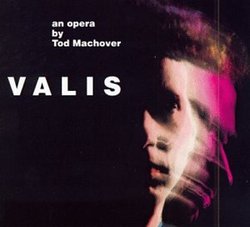 | Tod Machover, Anne Azema, Emma Stephenson Valis: An Opera by Tod Machover Genres: Dance & Electronic, New Age, Classical
With the premiere of his first opera, VALIS, at Paris's Pompidou Center in 1987, futurist composer Tod Machover--a former protégé of Pierre Boulez and professor at MIT's Media Lab--unveiled an audaciously experi... more » |
Larger Image |
CD DetailsSynopsis
Amazon.com With the premiere of his first opera, VALIS, at Paris's Pompidou Center in 1987, futurist composer Tod Machover--a former protégé of Pierre Boulez and professor at MIT's Media Lab--unveiled an audaciously experimental vision. It was a landmark in the evolution of the genre and managed to capture the interest of a new audience, much as Philip Glass's similarly revolutionary Einstein on the Beach had done a decade previously. VALIS (an acronym for "Vast Active Living Intelligent System") is based on the semi-autobiographical novel by science fiction writer Philip K. Dick. It's a metaphysical tale of multiple identities and psychological transformation, in which the protagonist endures a Parsifal-like quest to reintegrate his personality through understanding his vision of an alternate universe. Machover, who has more recently composed the interactive/Internet work Brain Opera as well as an opera based on the late Tolstoy novel Resurrection, fashioned a score of labyrinthine complexity to evoke the story's many-layered strands of meaning and imagery. Instead of a traditional orchestra, it calls for just two live players--a keyboardist and percussionist--and a formidable array of computer-generated sounds (including, for example, synthesizers, samplers, and "hyperinstruments" that subtly respond to the live musicians' gestures). These provide a richly contrasting sound world--ranging from terrifying splinters to a shimmering halo--for the cast of eight, who alternate between spoken voice-overs and amplified singing. Yet for all the technology, the music is consistently involving rather than cold and abstract and is enriched by Machover's enormous frame of reference. This is, after all, a work that incorporates hints not only of the Romantic poet Novalis but of the Who's rock opera Tommy. VALIS manages to integrate these elements into a mind-expanding journey that has extraordinary emotional resonance and depth. --Thomas May Similarly Requested CDs
|
CD ReviewsGreat Opera - spans Genres Moldyoldie | 04/04/2002 (5 out of 5 stars) "This is an incredible opera from the futurist composer Tod Machover. Based on the novel by Philip K. Dick (Bladerunner, The Minority Report) it follows Horselover Fat, down the path to insanity in a sci-fi environment. Excellent music and performances." Legend of a Mind(blower) Moldyoldie | Motown, USA | 03/27/2007 (4 out of 5 stars) "Based on the supposedly autobiographical novelized "exegesis" of the late science fiction author Philip K. Dick, this is a wildly experimental work which will obviously excite PKD fans (not necessarily moi) and anyone else who hankers for something modern and different (definitely moi!). The drugs, the insanity, the piercing beam of pink alien light -- it's all here!"
|

 Track Listings (22) - Disc #1
Track Listings (22) - Disc #1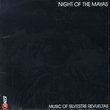
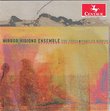

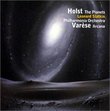
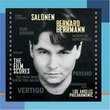


![Wagner: Tannhäuser [Highlights]](https://nationalbookswap.com/cd//m/68/2068/6142068.jpg)

